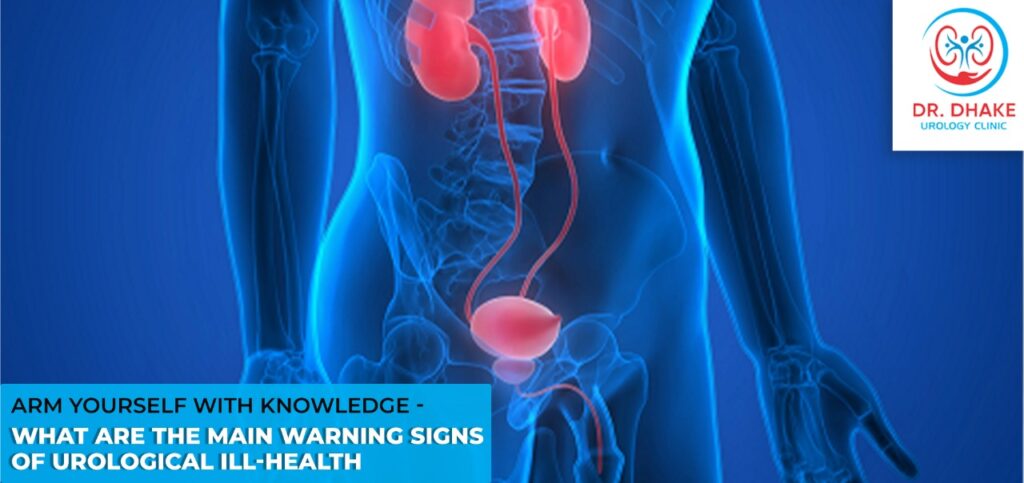
The majority of the time, urological health-related symptoms are unimportant and readily treatable. If you experience any of these symptoms, you should always see your doctor as soon as possible. In certain cases, they may be more serious.
Some of the main warning signs of a urological health issue can include:
1, Urine with blood
2. Having trouble passing urine, a slow urine flow, or experiencing pain while doing so
3. A greater urge to urinate or trouble to hold it in
4. Pee that appears murky or dark
5. The fifth sign is pelvic pain
6. Discomfort during sex
7. Dramatic weight loss
8. Bone pain or pain that prevents you from going about your daily life
9. Fatigue
10. Abnormally high or low body temperatures, such as those that cause a person to feel shaky and overheated (below 36C)
What could this mean?
Urinary Tract Infection (UTI)
Urinary tract infections (UTIs) can sometimes affect your urethra, kidneys, and bladder. UTIs can typically be treated at home, but they can also be treated with antibiotics. The symptoms can include lower stomach pain, frequent urination, blood in the urine, pain when passing urine, and a high temperature.
Home remedies including taking painkillers, getting enough rest, and drinking lots of water are frequently effective. You might have a brief course of antibiotics prescribed by some general practitioners. Additional treatment is offered if the issue persists (i.e., if there are more than 2 UTIs in 6 months).
Bladder and prostate cancer
The most typical indicator of bladder cancer is blood in the urine, which can also be a sign of prostate cancer. Along with pain when passing urine, these malignancies can also cause more frequent and urgent desires to urinate as well as weak or problematic urination. If you are a male who was born, you may experience benign prostate enlargement, a non-cancerous disorder that causes your prostate to expand as you age.
Although not necessarily a sign of cancer, these symptoms ought to be investigated as soon as possible.
Cervical cancer, Endometriosis
Blood in the urine, pain during sex, changes in vaginal discharge, and irregular bleeding should all be looked up right once as they could be symptoms of cervical cancer.
Conditions like endometriosis may also be associated with these symptoms. Endometriosis is a condition in which tissue that ordinarily grows in the womb’s lining begins to grow in other locations, such as the ovaries and fallopian tubes. Additional signs of endometriosis include severe menstrual discomfort and feeling sick or constipated.
Post-surgery urinary issues
Urinary problems are frequent during recovery from surgery and are often handled in hospitals. An indwelling or intermittent catheter may be used to address urinary problems like retention or incontinence. When you leave the hospital, you might need to conduct ISC for longer times in some situations and self-catheterize for a little period in others.
Neurological conditions and other conditions linked to incontinence
There are some neurological conditions that might lead to urinary health problems. It’s not unusual to experience problems with your bladder or bowels in addition to Multiple Sclerosis, an illness that damages your nerves. Although there is a wide range of MS symptoms, exhaustion, bowel and/or bladder problems, and increasing pain may be indicators. Treatment is available to help you feel more normal if your incontinence is brought on by a neurological condition.
Patients with the congenital disorder Spina Bifida may also have issues urinating.
I have one of these symptoms, what do I do next?
Focus on trying not to panic or feel embarrassed about your symptoms. It is always best to err on the side of caution because most doctors, nurses, and general practitioners have seen a wide variety of problems. To ensure you receive the most precise treatment possible, you must schedule a GP consultation if you encounter any of these symptoms. A blood test is frequently required to diagnose your symptoms.
To guarantee assistance from your doctor, we advise maintaining a daily journal of your symptoms. It is also beneficial to reflect on it when undergoing therapy or at doctor’s appointments.
Your chances of receiving effective treatments for more serious disorders, like cancer, will rise if they are discovered early. If you are found to have a condition, your nurse specialist or medical professional will direct you through the succeeding phases of your therapy.
There are numerous ways to treat bladder issues, including incontinence. A prescription may be written for medications, painkillers, diet and fitness regimens, or injections like Botox. You might need to either get an indwelling catheter put in or learn how to catheterize yourself. In more extreme cases, you might need surgery or bladder augmentation. Although these therapies appear to be challenging, with practice they will become a normal part of your routine.
Conclusion
It’s critical that you get assistance if anything doesn’t feel right because you are the expert on your body. Even though it can be extremely difficult to discuss genital or bladder health, we want to do our part to eradicate the persistent stigma so that you can receive the best care possible. Your chances of receiving a quick diagnosis can be severely harmed if you put off talking about something that worries you out of embarrassment.
If you are worried, ask your doctor about a quick blood test.
How can Hunter Urology help?
We offer a variety of catheters to meet different demands, including those of people with illnesses like:
• Those who have Mitrofanoff, a bladder augmentation, Spina Bifida, MS, or other neurological conditions
• Overgrown prostate
• Ruptures of the urethra
• Endometriosis
Arm yourself with knowledge – What are the main warning signs of urological ill-health?
The majority of the time, urological health-related symptoms are unimportant and readily treatable. If you experience any of these symptoms, you should always see your doctor as soon as possible. In certain cases, they may be more serious.
Some of the main warning signs of a urological health issue can include:
1, Urine with blood
2. Having trouble passing urine, a slow urine flow, or experiencing pain while doing so
3. A greater urge to urinate or trouble to hold it in
4. Pee that appears murky or dark
5. The fifth sign is pelvic pain
6. Discomfort during sex
7. Dramatic weight loss
8. Bone pain or pain that prevents you from going about your daily life
9. Fatigue
10. Abnormally high or low body temperatures, such as those that cause a person to feel shaky and overheated (below 36C)
What could this mean?
Urinary Tract Infection (UTI)
Urinary tract infections (UTIs) can sometimes affect your urethra, kidneys, and bladder. UTIs can typically be treated at home, but they can also be treated with antibiotics. The symptoms can include lower stomach pain, frequent urination, blood in the urine, pain when passing urine, and a high temperature.
Home remedies including taking painkillers, getting enough rest, and drinking lots of water are frequently effective. You might have a brief course of antibiotics prescribed by some general practitioners. Additional treatment is offered if the issue persists (i.e., if there are more than 2 UTIs in 6 months).
Bladder and prostate cancer
The most typical indicator of bladder cancer is blood in the urine, which can also be a sign of prostate cancer. Along with pain when passing urine, these malignancies can also cause more frequent and urgent desires to urinate as well as weak or problematic urination. If you are a male who was born, you may experience benign prostate enlargement, a non-cancerous disorder that causes your prostate to expand as you age.
Although not necessarily a sign of cancer, these symptoms ought to be investigated as soon as possible.
Cervical cancer, Endometriosis
Blood in the urine, pain during sex, changes in vaginal discharge, and irregular bleeding should all be looked up right once as they could be symptoms of cervical cancer.
Conditions like endometriosis may also be associated with these symptoms. Endometriosis is a condition in which tissue that ordinarily grows in the womb’s lining begins to grow in other locations, such as the ovaries and fallopian tubes. Additional signs of endometriosis include severe menstrual discomfort and feeling sick or constipated.
Post-surgery urinary issues
Urinary problems are frequent during recovery from surgery and are often handled in hospitals. An indwelling or intermittent catheter may be used to address urinary problems like retention or incontinence. When you leave the hospital, you might need to conduct ISC for longer times in some situations and self-catheterize for a little period in others.
Neurological conditions and other conditions linked to incontinence
There are some neurological conditions that might lead to urinary health problems. It’s not unusual to experience problems with your bladder or bowels in addition to Multiple Sclerosis, an illness that damages your nerves. Although there is a wide range of MS symptoms, exhaustion, bowel and/or bladder problems, and increasing pain may be indicators. Treatment is available to help you feel more normal if your incontinence is brought on by a neurological condition.
Patients with the congenital disorder Spina Bifida may also have issues urinating.
I have one of these symptoms, what do I do next?
Focus on trying not to panic or feel embarrassed about your symptoms. It is always best to err on the side of caution because most doctors, nurses, and general practitioners have seen a wide variety of problems. To ensure you receive the most precise treatment possible, you must schedule a GP consultation if you encounter any of these symptoms. A blood test is frequently required to diagnose your symptoms.
To guarantee assistance from your doctor, we advise maintaining a daily journal of your symptoms. It is also beneficial to reflect on it when undergoing therapy or at doctor’s appointments.
Your chances of receiving effective treatments for more serious disorders, like cancer, will rise if they are discovered early. If you are found to have a condition, your nurse specialist or medical professional will direct you through the succeeding phases of your therapy.
There are numerous ways to treat bladder issues, including incontinence. A prescription may be written for medications, painkillers, diet and fitness regimens, or injections like Botox. You might need to either get an indwelling catheter put in or learn how to catheterize yourself. In more extreme cases, you might need surgery or bladder augmentation. Although these therapies appear to be challenging, with practice they will become a normal part of your routine.
Conclusion
It’s critical that you get assistance if anything doesn’t feel right because you are the expert on your body. Even though it can be extremely difficult to discuss genital or bladder health, we want to do our part to eradicate the persistent stigma so that you can receive the best care possible. Your chances of receiving a quick diagnosis can be severely harmed if you put off talking about something that worries you out of embarrassment.
If you are worried, ask your doctor about a quick blood test.
How can Hunter Urology help?
We offer a variety of catheters to meet different demands, including those of people with illnesses like:
• Those who have Mitrofanoff, a bladder augmentation, Spina Bifida, MS, or other neurological conditions
• Overgrown prostate
• Ruptures of the urethra
• Endometriosis




